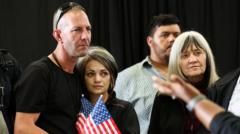The expedited arrival of 59 white South Africans in the US for refugee status — amid claims of racial discrimination and government denials — has sparked debate on the legitimacy of their claim and the implications for U.S. immigration policy.**
White South Africans Granted Refugee Status in the US Amid Controversial Circumstances**

White South Africans Granted Refugee Status in the US Amid Controversial Circumstances**
A group of 59 white South Africans arrives in the US under a special refugee program instituted by Donald Trump, raising questions about racial biases in refugee admissions.**
A significant diplomatic incident unfolded this week as a group of 59 white South Africans landed at Dulles Airport, Washington, D.C., receiving expedited refugee status under a controversial plan put forth by former President Donald Trump. This refugee categorization, which Trump framed as protection for victims of "racial discrimination," has ignited vehement responses from both the South African government and human rights organizations.
While Trump indicated that these Afrikaners are facing a "genocide," South African President Cyril Ramaphosa argued during a phone conversation with Trump that this characterization is unfounded. Ramaphosa emphasized that true refugees leave their home countries due to legitimate threats of persecution, clarifying that this group does not fulfill such criteria.
Human Rights Watch criticized the move, highlighting the inconsistency it presents alongside the administration's halt of other refugee admissions, particularly for individuals from conflict zones like Afghanistan. The approval of the Afrikaners' cases — normally a lengthy and meticulous process — stands in stark contrast to the plight of thousands still awaiting judgment.
Upon their arrival, the newly arrived South Africans were greeted with American flags and balloons, signifying a warm welcome from the US government. However, the inclusion of this specific group has sparked widespread criticism, with commentators labeling it a racially charged maneuver designed for political gain.
Legal experts and advocates, such as Melissa Keaney from the International Refugee Assistance Project, decried the preferential treatment extended to the Afrikaners as hypocritical and outlined the grim reality of over 120,000 conditionally approved refugees left in limbo by a US refugee admissions program that has since been suspended.
Democratic Representative Gregory Meeks expressed concern regarding the implications of this policy shift, arguing it indicates a disturbing trend towards racial and political favoritism in US refugee policies. The Episcopal Church's decision to ceases its cooperation with governmental refugee settlement services further highlights the discontent stemming from this new approach, which critics perceive as problematic and unjust.
As these discussions unfold, the relationship between the United States and South Africa continues to grow tenuous, particularly in light of the contentions surrounding land reform and the treatment of white farmers in South Africa. While accusations regarding an ongoing genocide have been widely condemned by experts, the ramifications of this week’s events serve as an introductory chapter in what promises to be a contentious debate regarding race, immigration, and refugee policy in both nations.






















